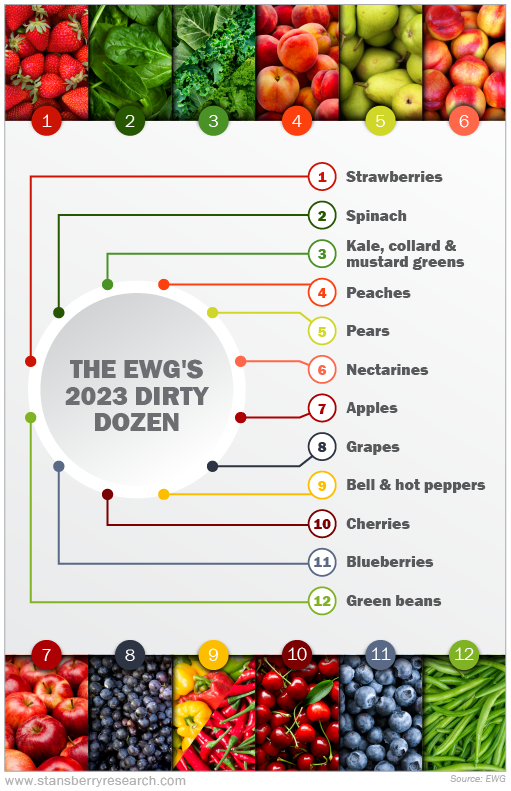My favorite "super" food could be poisoning you...
Every year, the Environmental Working Group ("EWG") creates a "Dirty Dozen" list – the 12 foods that have the highest amounts of pesticides. The organization analyzes produce throughout the year to show which 12 products are notoriously laced with chemicals likely harmful to humans.
Longtime subscribers know I've recommended following EWG's list for years. But this year, my favorite superfood ended up in the Dirty Dozen list – blueberries.
This year's Dirty Dozen are, starting with the most harmful:
You'll notice that this list contains some of the most beneficial foods you can eat...
Longtime readers know that I call blueberries the "perfect blue food." They're packed with antioxidants (like vitamin C, vitamin E, beta-carotene, fiber, and manganese), flavonoids, anthocyanins (this gives them the blue color), and other nutrients. They can lower cholesterol, improve eyesight, and reduce inflammation.
Spinach is another food you should eat every day. It's high in vitamins C, E, and K, along with iron. And just one cup of spinach has nearly half a day's worth of your body's magnesium need. Magnesium is considered one of the seven essential macrominerals that the body needs in large amounts each day. And it plays a role in more than 300 mechanisms in the body, like:
- Helping nerve function
- Muscle contraction and relaxation
- Regulating blood pressure
- Lowering blood sugar
Next, hot peppers are what I call an excruciating "feel good" food. When you eat a hot pepper, your brain thinks your tongue is on fire. It responds by firing off a lot of endorphins and dopamine – feel-good chemicals that bring on a state of relief and happiness. Plus, the endorphins shut down the pain receptors from experiencing more pain. So you essentially get pain relief in the wake of that initial shock.
But peppers don't just bring happiness and pain relief. Several areas of study have shown promising results that capsaicin – the chemical that gives peppers their heat – could help you live longer and even prevent cancer.
None of these are foods you should just cut out of your diet.
A common link between the foods on the EWG's Dirty Dozen list is that most of them have thin skin that more easily absorb the nasty chemicals that farmers apply to them. Pesticides can cause rashes and redness of the skin, and some trigger more severe allergic reactions.
Worse, research shows links between foods containing certain pesticides and Parkinson's disease, as well as human thyroid dysfunction. These poisons also alter human liver and brain function.
And the effects happen indirectly from just minute amounts of these chemicals. In the smallest amounts, they contaminate water supplies, which can kill animals and result in human birth defects.
Again, this doesn't mean you should avoid eating these foods. It just means you should take steps to avoid their pesticides.
The best first step is to choose organic when buying any of the Dirty Dozen.
It's true that in some cases, buying organic isn't worth the added cost... But with foods known to come with the highest concentration of pesticides, it helps. Typically, organic versions have much lower levels of harmful chemicals, as well as fewer dangerous ones. According to the EWG, you can cut your consumption of pesticides by 80% by switching to organic versions of the Dirty Dozen foods.
But remember, "organic" farms still use various chemicals and pesticides. They just use ones certified by the National Organic Standards Board. Two of the most common organic pesticides are rotenone and pyrethrin. At high exposure levels, rotenone has a possible link to Parkinson's disease, and pyrethrin can cause people to have tremors, aggressive behavior, and excessive salivation.
That's why buying organic isn't the only step you should take. Do what I do and wash, soak, and rinse your produce, too...
The rinse I prefer for produce is a mix of water and white vinegar (about 3 to 4 parts water to 1 part vinegar). I let everything soak for a few minutes and then rinse off the fruits and vegetables with just water. This method is effective since most of the pesticides' residue sits on the skin.
A study from the Journal of Food Protection also showed that simply letting leafy greens soak in cold tap water for two minutes before rinsing had the same effect. That's good for folks who don't like the taste of vinegar in their salads (not me).
The EWG also has a "clean" list of produce that's least contaminated with pesticides. When buying something on the clean list, I save a few bucks and skip the organic offerings. Check out this year's "Clean Fifteen" list here.
What We're Reading...
- Something different: French fries could increase your risk of anxiety and depression.
Here's to our health, wealth, and a great retirement,
Dr. David Eifrig and the Health & Wealth Bulletin Research Team
April 27, 2023

